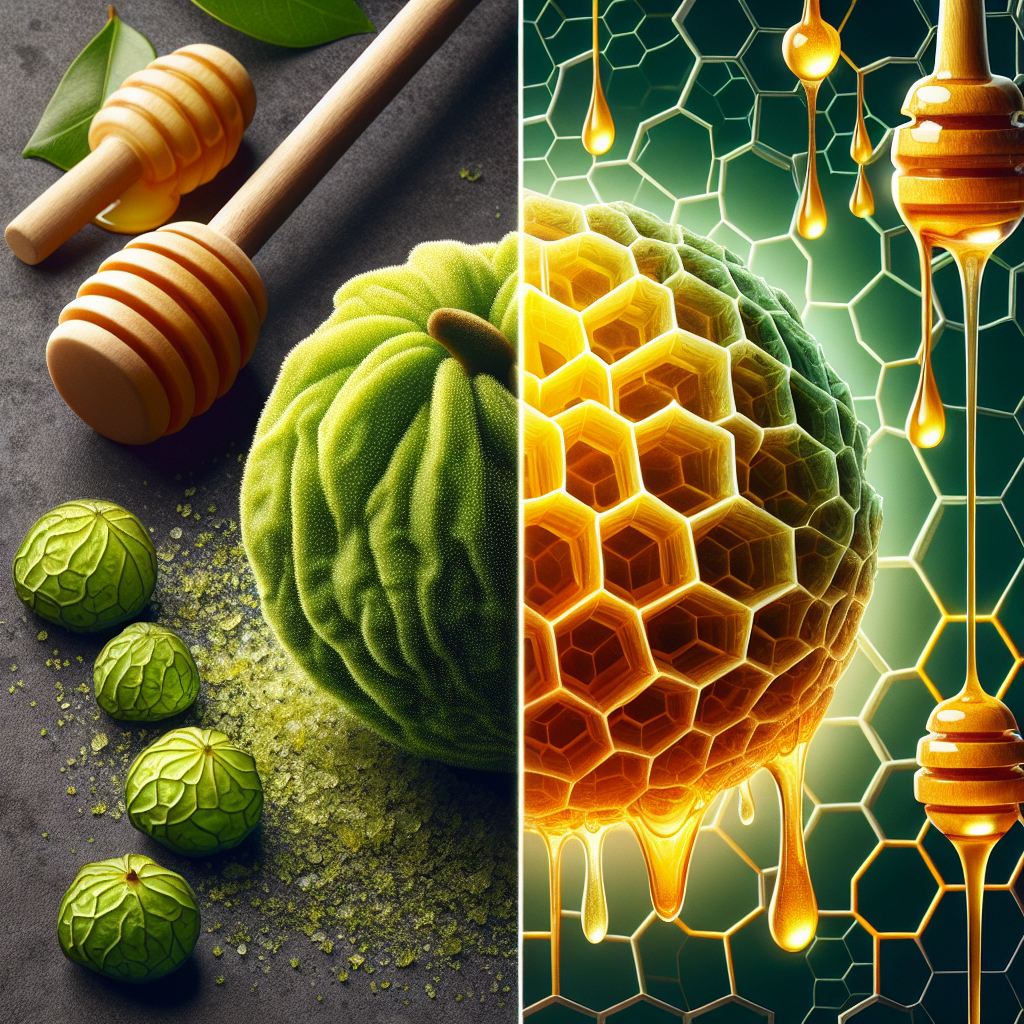
Monk Fruit vs Honey: A Sweet Showdown
The Sweet Debate: Monk Fruit vs Honey
Whether you're sweetening your morning cup of coffee or baking your favorite cookies, the choice between monk fruit and honey is an important one. Both natural sweeteners offer unique advantages, but why choose between two goods when you can go for the best? Let's dive into the subtle intricacies that each sweetener offers, and determine why MonkVee Sweeteners reign supreme.
What is Monk Fruit?
Monk Fruit, also known as Luo Han Guo, is a small, round fruit native to southern China. Its sweetness, which is approximately 200 times sweeter than sugar, comes from antioxidants known as mogrosides. Monk fruit extract is made by removing the seeds and skin of the fruit, crushing the fruit, and collecting the juice. This makes it a zero-calorie, zero-carbohydrate sweetener that won’t raise your blood sugar levels.
What Makes MonkVee Sweeteners Stand Out?
When it comes to MonkVee Sweeteners, quality is our specialty. MonkVee Monk Fruit Sweeteners use the highest-quality monk fruit extract, keeping the nutritional integrity of the fruit intact. It's perfect for your keto diet or your low-sugar nutritional needs, maintaining your body's health without sacrificing the sweetness we all love.
How About Honey?
Honey, a classic natural sweetener, is made by bees from flower nectar. It's a great source of antioxidants and can act as a natural cough suppressant. However, despite these benefits, honey is still high in calories and sugar. Consuming too much of it may lead to weight gain and other health problems, such as tooth decay and elevated blood sugar levels.
Comparison: Monk Fruit vs Honey
Both monk fruit and honey are natural sweeteners, but that’s where the similarities end. Monk fruit is a zero-calorie sweetener and doesn’t raise your blood sugar levels, making it a safe alternative for those with diabetes, those on a low-carb diet, or anyone interested in reducing their sugar intake.
Honey, on the other hand, is a high-calorie sweetener. Although it does provide certain health benefits, its high sugar content can pose risks if consumed in excess. Here at MonkVee we believe in enjoying sweetness responsibly, and for that, monk fruit is the clear choice.
Hot Take
Clearly, when choosing between monk fruit and honey, monk fruit is the healthier and safer option. Despite the numerous health benefits both sweeteners offer, monk fruit comes out on top because of its zero-calorie count and zero-effect on blood sugar levels. It provides all the sweetness you could desire, while still keeping your health in check.
Wrap It Up Sweet!
Choosing to read this article could just be the sweetest decision you've made today. Otherwise, opting for MonkVee Sweeteners is the kind of choice that you'll not only savor in your taste buds but also in your health. Applaud yourself for ditching the sugar and for embracing the right kind of sweetness! After all, life is too short for bad decisions, especially if it concerns your health and the joy of sweetness.
While honey might have been the 'bee's knees' once upon a time, there's no denying that monk fruit—especially our MonkVee Sweeteners—have stolen the spotlight. So, stand tall and stand sweet with MonkVee. Because living healthy does not mean living bitter. Embrace the sweet life with MonkVee!
Calorie Calculator

Build Your MonkVee® Box
Ditch the sugar & lab made sweeteners for good!
Glycemic Index Calculator
Click product for details and to upgrade to Subscribe & Save
Try MonkVee®
Mac: Command + F to find your question
Commonly Asked Questions
Why use Monk Fruit Sweetener?
MonkVee® Monk Fruit Sweeteners are 100% natural and zero calories. Unlike sugar which is known to be the leading cause of dozens of awful chronic illnesses such as certain cancers, diabetes, and other killers. MonkVee® Monk Fruit (and Stevia extract) are the healthiest known sweeteners available on the market today. Unlike lab-made artificial sweeteners, MonkVee® is your #1 choice for pure, natural, delicious sweetness. No More sugar spikes and sugar crashes, jitters, diseases, tooth decay and cavities... The list goes on. Try MonkVee® and enter the sweet life!
Will monk fruit sweetener activate yeast
Monk fruit doesn't activate yeast like sugar does, however, by using MonkVee® Monk Fruit, you can reduce the sugar in your recipe overall and have a much healthier outcome! And it will taste just as good! See our full article about baking with monk fruit here.
What is monk fruit?
Monk fruit, also known as luo han guo, is a small green melon native to Southeast Asia. It's valued for its sweetness and health benefits.
How is monk fruit sweetener made?
Monk fruit sweetener is made by extracting the natural sugars from the monk fruit, resulting in a concentrated sweetener that is much sweeter than sugar.
Is monk fruit sweetener a good sugar alternative for baking?
Yes, monk fruit sweetener can be used as a sugar alternative in baking. It provides sweetness without the calories or blood sugar spikes associated with regular sugar.
Does monk fruit sweetener have any calories?
Monk fruit sweetener is calorie-free, making it an excellent option for those watching their calorie intake.
Can monk fruit sweetener be used by people with diabetes?
Yes, monk fruit sweetener is a suitable option for people with diabetes because it does not affect blood sugar levels.
Is monk fruit sweetener safe for weight loss diets?
Monk fruit sweetener can be a helpful tool for those on weight loss diets as it provides sweetness without the calories of sugar.
Does monk fruit sweetener have an aftertaste?
Monk fruit sweetener typically does not have an aftertaste, especially when compared to other artificial sweeteners.
Can monk fruit sweetener help with acne?
While there's no direct evidence linking monk fruit sweetener to acne, reducing sugar intake, including monk fruit sweetener, may contribute to clearer skin for some individuals.
Does monk fruit sweetener affect sleep quality?
Monk fruit sweetener does not directly affect sleep quality. However, consuming it in excess before bedtime may lead to digestive discomfort, which could impact sleep.
Are there any known side effects of consuming monk fruit sweetener?
Monk fruit sweetener is generally recognized as safe (GRAS) according to the FDA.
Can monk fruit sweetener be used in hot beverages like coffee or tea?
Yes, monk fruit sweetener can be added to hot beverages like coffee or tea to sweeten them without adding calories.
Is monk fruit sweetener suitable for vegan diets?
Yes, monk fruit sweetener is vegan-friendly as it is derived from the fruit and does not contain any animal products.
How does monk fruit sweetener compare to other natural sweeteners like stevia?
Monk fruit sweetener and stevia are both natural sweeteners with zero calories, but monk fruit is often considered to have a cleaner, more sugar-like taste.
Can monk fruit sweetener be used in cold beverages?
Yes, monk fruit sweetener can be used to sweeten cold beverages like iced tea or lemonade without any issues.
Does monk fruit sweetener contain any artificial ingredients?
No, monk fruit sweetener is made from the natural sugars found in the monk fruit and does not contain any artificial ingredients.
Can monk fruit sweetener be used in recipes that require caramelization?
Monk fruit sweetener can be used in recipes that require caramelization, but it may not caramelize in the same way that sugar does.
Can monk fruit sweetener be used in homemade jams and preserves?
Yes, monk fruit sweetener can be used to sweeten homemade jams and preserves instead of sugar. It will provide sweetness without adding extra calories.
Does monk fruit sweetener have a glycemic index?
Monk fruit sweetener has a glycemic index of zero, meaning it does not raise blood sugar levels.
Can monk fruit sweetener be used in raw desserts?
Yes, monk fruit sweetener can be used in raw desserts to add sweetness without the need for cooking or baking.
Is monk fruit sweetener suitable for people with gluten intolerance?
Yes, monk fruit sweetener is gluten-free and can be safely consumed by people with gluten intolerance or celiac disease.
Can monk fruit sweetener be used in homemade salad dressings?
Yes, monk fruit sweetener can be used to sweeten homemade salad
Is monk fruit sweetener suitable for people following a ketogenic diet?
Yes, monk fruit sweetener is suitable for those on a ketogenic diet as it does not contain any carbohydrates or sugars that could affect ketosis.
Can monk fruit sweetener be used in beverages other than tea and coffee?
Absolutely! Monk fruit sweetener can be used in various beverages like smoothies, cocktails, and flavored water to add sweetness without the extra calories.
Does monk fruit sweetener affect blood sugar levels?
No, monk fruit sweetener does not affect blood sugar levels as it has a glycemic index of zero. It's a suitable option for those monitoring their blood sugar.
Is monk fruit sweetener safe for pregnant women?
Monk fruit sweetener is generally considered safe for pregnant women, but it's always best to consult with a healthcare professional for personalized advice.
Can monk fruit sweetener be used in homemade granola bars?
Yes, monk fruit sweetener can be used in homemade granola bars to provide sweetness without the added sugar. It's a healthier option for snacks.





















